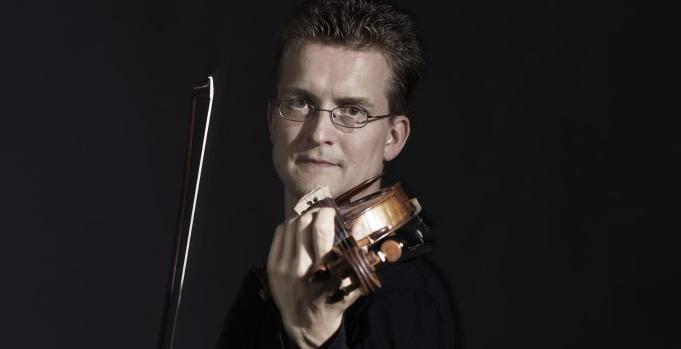When you hear Christian Tetzlaff play you hear Brahms, or Beethoven or, in this case, Bach. What you don’t hear a lot of is Tetzlaff himself. I mean that in the best possible way – so willing is the violinist to submerge himself, to set aside ego and agenda. It’s an approach that is at its purest in Bach’s solo violin music, and as he presented the sonatas and partitas to a full Wigmore Hall last night the generosity of this extraordinary musician allowed his audience to set ourselves aside for a moment too as we listened.
It has been almost 20 years since Tetzlaff first recorded Bach’s complete music for solo violin (there’s also a 2005 recording) and since then he has gained noticeable weight to his sound. The top line, an unbroken horizon, is still effortlessly and sweetly dominant, but underneath Bach’s harmonic musculature has gained tone and heft. The range of textures available to him is greater than ever, and while the softer gestures are perhaps the more intriguing it is a delight to hear him set the Wigmore’s dome ringing with the resonance of his full force.
The A minor Allegro was a cascading, pirouetting release of nervous energy, dodging cross-rhythms on all sides
The speeds however have remained broadly the same. Only a musician as technically and idiomatically accomplished as Tetzlaff could save the Allegro from the A minor Sonata or the Corrente from the D minor Partita from feeling snatched at the pace he takes them – Corrente (from the French courir – “to run”) becomes rather literal in his hands. Yet his ear, alive to the clarity of counterpoint and never sacrificing the dance for salon virtuosity, somehow sees him through.
At times this risk becomes ecstatic. The Preludio that opens the Partita in E needed this urgency to shake off the still-looming shadow of the mighty D minor Ciaccona, and the A minor Allegro was a cascading, pirouetting release of nervous energy, dodging cross-rhythms on all sides. But for my money the Giga from the D minor Partita risked much more technically for a much smaller musical pay-off.
 Among all the semiquaver dramatics however Tetzlaff still guided his audience into the deeper waters of this music. The passing moments of stillness and interiority in the D minor’s Ciaccona spoke of something beautiful but beyond reach, while the C major Largo had the mothy softness of a Whistler nightscape. Repeats in this music perform an essential structural function, but Tetzlaff seizes their expressive potential too. Again and again we heard him rework the affirmative opening declaration of a theme in its repeat, turning a statement into a question – and one by no means certain of its answer.
Among all the semiquaver dramatics however Tetzlaff still guided his audience into the deeper waters of this music. The passing moments of stillness and interiority in the D minor’s Ciaccona spoke of something beautiful but beyond reach, while the C major Largo had the mothy softness of a Whistler nightscape. Repeats in this music perform an essential structural function, but Tetzlaff seizes their expressive potential too. Again and again we heard him rework the affirmative opening declaration of a theme in its repeat, turning a statement into a question – and one by no means certain of its answer.
Movements too, for Tetzlaff, tend to reject certainty in their endings. The closing virtuosity of the Partita in E’s Gigue found itself cheekily subverted by a refusal to storm grandly into the final cadence, while weightier movements withdrew frequently into a soft and unexpected place for the finish.
There is something so classical (in the Greco-Roman sense) about Tetzlaff’s playing. You get the feeling listening to him that he loves to play beautifully, and where other soloists embrace the grit and flourish in the ugly-beautiful moments he really has to push himself into that place. He is at his best in the architectural balance of Bach’s counterpoint, and here both the C major and A minor fugues attained real depth from their juxtaposed lines.
Fortunately this was only the first concert of Tetzlaff’s residency at the Wigmore Hall, and over the coming months we can enjoy this elegant violinist in partnership with different repertoires and musicians. His Bach however might just prove impossible to beat.














Add comment